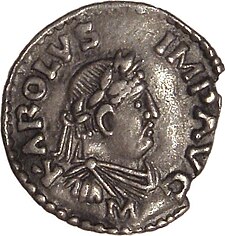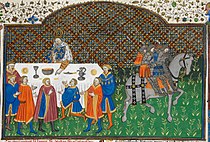Charles the Great
| Charlemagne | |
|---|---|

A denarius of Charlemagne dated c. 812–814 with the inscription KAROLVS IMP AVG (Karolus Imperator Augustus) (Latin)
|
|
| Holy Roman Emperor | |
| Reign | 25 December 800 – 28 January 814 |
| Coronation | 25 December 800 Old St. Peter's Basilica, Rome |
| Predecessor |
|
| Successor | Louis the Pious |
| King of the Lombards | |
| Reign | 10 July 774 – 28 January 814 |
| Coronation | 10 July 774 Pavia |
| Predecessor | Desiderius |
| Successor | Louis the Pious |
| King of the Franks | |
| Reign | 9 October 768 – 28 January 814 |
| Coronation | 9 October 768 Noyon |
| Predecessor | Pepin the Short |
| Successor | Louis the Pious |
| Born | 2 April 742 Frankish Kingdom |
| Died | 28 January 814 (aged 71) Aachen, Francia (Germany) |
| Burial | Aachen Cathedral |
| Spouse |
|
| Issue Among others |
|
| Dynasty | Carolingian |
| Father | Pepin the Short |
| Mother | Bertrada of Laon |
| Religion | Roman Catholicism |
| Signum manus | |
 |
|
|
|
|
|
|
Charlemagne (/ˈʃɑːrlᵻmeɪn/; 2 April 742/747/748 – 28 January 814), also known as Charles the Great (Latin: Carolus or Karolus Magnus) or Charles I, was King of the Franks. He united much of Europe during the early Middle Ages and laid the foundations for modern France, Germany and the Low Countries. He took the Frankish throne in 768 and became King of Italy in 774. From 800, he served as the first Holy Roman Emperor—the first recognised emperor in Western Europe since the fall of the Western Roman Empire three centuries earlier.
The expanded Frankish state that Charlemagne founded was called the Carolingian Empire.
Charlemagne was the oldest son of Pepin the Short and Bertrada of Laon. He became king in 768 following his father's death, initially as co-ruler with his brother Carloman I. Carloman's sudden death in 771 in unexplained circumstances left Charlemagne as the undisputed ruler of the Frankish Kingdom. Charlemagne continued his father's policy towards the papacy and became its protector, removing the Lombards from power in northern Italy and leading an incursion into Muslim Spain. He campaigned against the Saxons to his east, Christianising them upon penalty of death, leading to events such as the Massacre of Verden. Charlemagne reached the height of his power in 800 when he was crowned Emperor of the Romans by Pope Leo III on Christmas Day at Old St. Peter's Basilica.
...
Wikipedia
